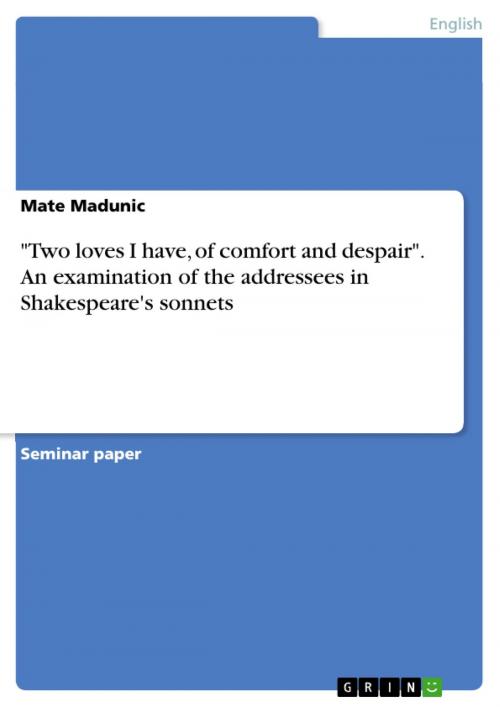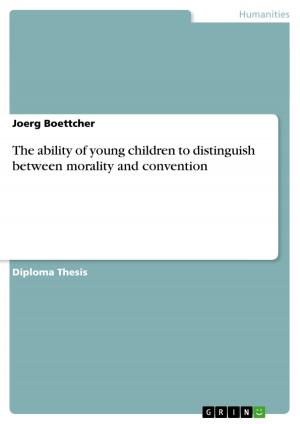'Two loves I have, of comfort and despair'. An examination of the addressees in Shakespeare's sonnets
An examination of the addressees in Shakespeare`s sonnets
Fiction & Literature, Literary Theory & Criticism, British| Author: | Mate Madunic | ISBN: | 9783640166480 |
| Publisher: | GRIN Publishing | Publication: | September 15, 2008 |
| Imprint: | GRIN Publishing | Language: | English |
| Author: | Mate Madunic |
| ISBN: | 9783640166480 |
| Publisher: | GRIN Publishing |
| Publication: | September 15, 2008 |
| Imprint: | GRIN Publishing |
| Language: | English |
Seminar paper from the year 2006 in the subject English Language and Literature Studies - Literature, grade: 1,3, Ruhr-University of Bochum (Englisches Seminar), course: Elizabethan poetry, 2 entries in the bibliography, language: English, abstract: 'Two loves I have, of comfort and despair' - for somebody who is familiar with that kind of poetry, this beginning of Shakespeare's sonnet 144 should be striking for at least two reasons: 1) For one thing, it is the fact that the lyrical speaker talks of two loved ones. Usually, sonnets praise one beloved person (or concept, such as love itself) which the speakers love with all their heart but which they cannot reach for one reason or another. 2) The emotions the lyrical speaker has towards those loves are quite strange: 'comfort and despair'. Typically, the predominant if not the only feeling the speakers of such love poetry have is love, without any further requests, regrets, or conditions under which they love, especially without such biased concepts as 'comfort and despair'. Hopefully, it becomes clear that this Shakespearean sonnet is far from being typical of the genre, at least as far as the treatment of the addressee is concerned. However, this peculiarity is not only limited to this poem, but it permeates all of Shakespeare's sonnets, which are an outstanding example of the development and changes taking place within that genre. And this is also the reason why, in this paper, I will be concerned with Shakespeare's addressees in his sonnets, pointing to striking attitudes the speaker has towards his addressees, hinting at the development of the relations, and also outlining the Elizabethan sonnet tradition. [...]
Seminar paper from the year 2006 in the subject English Language and Literature Studies - Literature, grade: 1,3, Ruhr-University of Bochum (Englisches Seminar), course: Elizabethan poetry, 2 entries in the bibliography, language: English, abstract: 'Two loves I have, of comfort and despair' - for somebody who is familiar with that kind of poetry, this beginning of Shakespeare's sonnet 144 should be striking for at least two reasons: 1) For one thing, it is the fact that the lyrical speaker talks of two loved ones. Usually, sonnets praise one beloved person (or concept, such as love itself) which the speakers love with all their heart but which they cannot reach for one reason or another. 2) The emotions the lyrical speaker has towards those loves are quite strange: 'comfort and despair'. Typically, the predominant if not the only feeling the speakers of such love poetry have is love, without any further requests, regrets, or conditions under which they love, especially without such biased concepts as 'comfort and despair'. Hopefully, it becomes clear that this Shakespearean sonnet is far from being typical of the genre, at least as far as the treatment of the addressee is concerned. However, this peculiarity is not only limited to this poem, but it permeates all of Shakespeare's sonnets, which are an outstanding example of the development and changes taking place within that genre. And this is also the reason why, in this paper, I will be concerned with Shakespeare's addressees in his sonnets, pointing to striking attitudes the speaker has towards his addressees, hinting at the development of the relations, and also outlining the Elizabethan sonnet tradition. [...]















